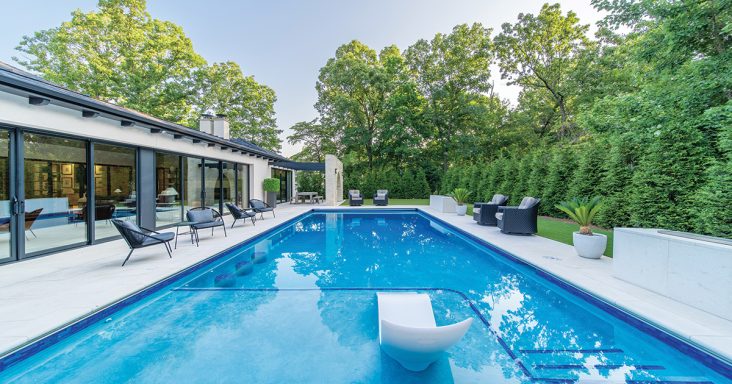Matt Wait goes full time into the custom home business
by March 11, 2025 12:47 pm 2,133 views

How does a Razorback punter with a degree in financial management and a successful career in medical sales for an international firm make a career switch to homebuilder in Northwest Arkansas at the age of 50? Easy. It was destined to happen all along.
Matt Wait, owner of Fayetteville-based Matt Wait Custom Homes, has been building homes since he was a kid. He’s a third-generation builder who took a slight detour for a couple of decades.
“My dad and grandpa were builders,” Wait said. “When my dad was building houses, the builders would do everything: plumber, electrician, heating and air, roof, framing, foundation, Sheetrock, carpentry and trim. I mean, they do everything. That was the builder back then, so I had an expert behind the scenes just showing me the scope and getting it sequenced.”
Wait grew up in the Hot Springs area and was a four-year letterman with the Arkansas Razorbacks as a punter from 1993 to 1997. He graduated with a bachelor’s degree in financial management and went to work for International Paper, AstraZeneca and Abbott handling accounts, specializing in sales, and as a territory manager.
He admits that as a boy when he’d work job sites with his dad, the homebuilding business was anything but glamorous. Wait said his title was “grunt,” and he spent plenty of time cleaning up construction messes and doing jobs that no one would want to do.
He built a home in 1998 using a local builder, but didn’t really like the process. He decided then that any future home he’d build, he’d do it himself. To date, he’s built six custom homes and has decided to ramp up full time and leave corporate America for now.

Wait’s primary niche will be custom homes mainly in the $1.5 million to $3 million range, whether that’s a home in a gated community, a new subdivision, or a tear-down and rebuild. He isn’t planning to compete with national builders who are developing larger-scale neighborhoods or communities; his work will be more selective and targeted to meet the needs of homeowners who want upscale finishes. He may even do some spec homes with high-end touches.
“The custom market is definitely a good place to be,” he said. “I feel like if you’re going to pay a premium for it, in my opinion, there’s certain things that you should expect.”
RISING COSTS
The construction industry locally and nationally has been dealing with rising costs for most of this decade. The COVID-19 pandemic jammed supply chains worldwide, and the aftereffects are still being felt.
Construction materials, including lumber and steel, escalated with inflation and haven’t tapered off. President Donald Trump’s tariff trade strategy risks exacerbating the costs for construction supplies and products.
A tight labor market can cause huge delays on projects, especially with subcontractors who have more work than they can handle. Federal immigration policy changes, which have yet to be fully communicated or executed, could also be a factor affecting construction labor that has a sizable component of migrant, seasonal and transient help.
Add to the mix that nearly 1,000 people a month are moving to Northwest Arkansas where affordable — and expensive — housing inventory is strained. The whole model of supply and demand is tilted heavily to the side of demand. Wait said the price per square foot for many residential areas of Northwest Arkansas is running much higher than just a few years ago.
“Everybody’s price point is different,” he said. “I can do a less expensive home, or I can do an expensive home. It’s the same scenario for me. I treat them the same. If it’s a lower price point or a higher price, it doesn’t matter. It’s all the same process to me. But, as an example, $200 a square foot, that is just a normal house now that used to be less than a hundred bucks a square foot. Now, that’s your new norm, and it’s almost impossible to even get there.”
Some custom homes can top $500 per square foot, Wait said, but the region needs homes at all price points, especially affordable housing for first-time homebuyers.
TRENDS AND DATA
Though interest rates have doubled from decades-long lows, Northwest Arkansas home sales are still robust.
About 400 homeowners move into Northwest Arkansas annually, according to data from the UA Sam M. Walton College of Business. Home sales in the region saw a healthy 2024 with 10,569 homes sold in Benton and Washington counties, according to the Northwest Arkansas Board of Realtors. That was an improvement from 9,812 homes sold in 2023 when interest rates spiked, but lower than 10,924 homes sold in 2022.
More than 12,000 homes were sold in both 2020 and 2021 when many markets saw record activity led by the pandemic’s changes for home-bound workers, low interest rates and consumer stimulus money.
In the first month of this year in Northwest Arkansas, 643 homes sold, a 21% improvement from 531 closings in January 2024, according to the board. In the past five years, average home prices in the region have jumped from $196,431 to $355,000.
At the recent economic forecast luncheon hosted by the University of Arkansas’ Center for Business and Economic Research, Sam Khater, chief economist at Freddie Mac, spoke on the rising housing costs that continue to keep inflation elevated with the growing shortage of lower-priced homes.
He said builders have largely stopped building starter homes that consumers within 80% of the median income can afford to buy. This is happening at the same time families living in smaller homes might move up, but the average 3% mortgage is keeping them in place. Khater said while a 7% mortgage is normal historically, families can buy less house for what they sell for. The cost of ownership has increased because of relatively higher interest rates. He estimates the average family would lose $47,000 in home equity if they tried to move from their 3% mortgage.
“We have gotten so used to the low, low rates, and they are not coming back barring some major shock to the economy,” Khater said. “The Fed is trying to avoid the mistakes it made previously by lowering rates fast and keeping them low too long.”
Northwest Arkansas is an exception to the national trend as the influx of new residents to the region is leading to booming housing demand. That’s good news for homebuilders like Wait and his peers at all price points.
“This market is not going to slow down. It’s going to move. It’s going to continue to grow,” said Wait, who sees subdivisions sprouting up in towns in and around Bella Vista, Cave Springs, Centerton, Elm Springs and Tontitown. “And if you’re inside the city and you’re somewhere convenient, all that stuff is going up too. It’s never going backward.”
Wait doesn’t appear to be going backward either. His passion for home building is not only rooted in his DNA through his father and grandfather; it’s also similar to all of the other hard work he’s put in over the years from school to football to sales.
“With building houses, you have a sense of accomplishment from start to finish … It’s something tangible. The job is so rewarding,” he said.
Editor’s note: Kim Souza contributed to this report.
